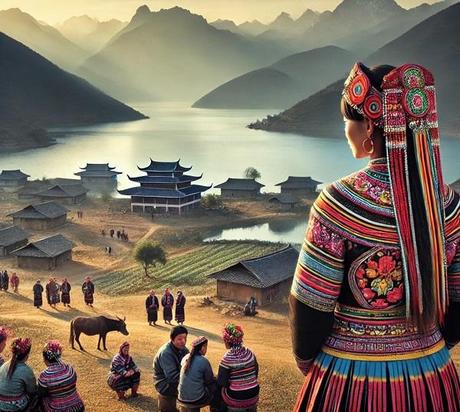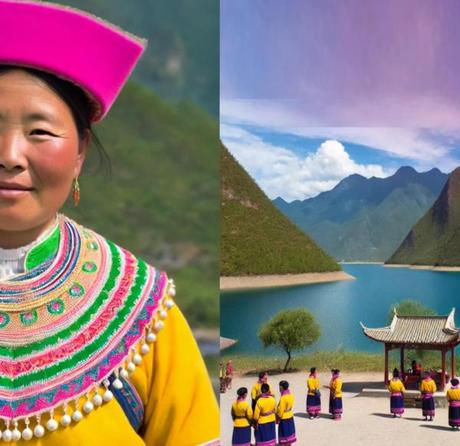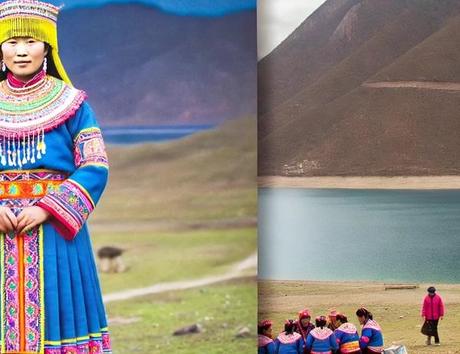
In a world where male dominance has been blamed for so many of society’s ills, the Mosuo tribe at the foothills of the Himalayas in Southwest Yunnan, China feels like an alien community. Many feminists and journalists describe it as a utopian matriarchal society where men are nothing more than sperm donors and labourers. There are no fathers or grandfathers there and wives have no obligation to stay with or listen to their husbands. For the Mosuo, a grandmother is the law of the household and her sons and daughters make up her lineage with the eldest daughter being the next in line for the leadership of the house. The extended family is responsible for providing and taking care of children. Well, here are 10 more things you need to know about this fast-disappearing Tibetan tribe.
Women Can Have As Many Partners As They Want
A lover is called an Axia among the Mosuo and that goes for both genders. A woman has the final say over who goes into her quarters though and that can be as many as she likes. The only sign that a lady is occupied is the hat of a man on the handle of the woman’s quarters. The relationships are not laid down in stone because no one has to say “I Do.” Having an Axia is seen as a way of having pleasures and taking a break from the strain of everyday life rather than a commitment-based partnership where one partner is responsible for the other. There is therefore no pressure based on looks, economic standing or other factors women use to choose lovers in the rest of the world.
Men Have No Say About Having Babies
While encroachment of foreign influence is changing society and giving men a voice, it isn’t available to them when it comes to having children. A wan can choose which man she wants to be the father of her children even if they don’t have a future together. Many tourists from other Chinese communities condemn them as a community of single mothers but they believe that their right of choice is a perfect way to live.
Every Family Is Headed By A Matriarch
By Matriarch, it is mostly a grandmother or the eldest female member of the extended family who is considered the head of the family. Decisions are still democratic though so a round table may discuss critical family issues, but the matriarch has the final say. That means that even if the family’s eldest male member is older than the female, the female still remains the head of the house. The women also inherit all the property and are in charge of all the financial decisions so they decide who gets what portion of the family wealth.

They Practice “Walking Marriages”
The Mosuo themselves say that “it is the men who do the walking and not the women.” That is true because the man doesn’t have a home of his own and the if no woman is taking him for the night, he will have to sleep under his mother’s roof in spite of his age. The walking marriages mean that both men and women can have as many partners as they want. The men can only have one that will take them though, so they will move from house to house depending on the ladies’ choices.
The Children Take Their Mother’ Surnames
In the rest of the world, a surname is given down by the patriarchy. For the Mosuo, the man is not considered the giver of the lineage and so doesn’t get to give the surname. The entire extended family carry the name of the head of the family and the children are raised in the matriarch’s house by the siblings and other blood relatives of the mother. The children, therefore, belong with their mother and so she gets to give them her own surname.
Fathers Still Take Responsibility Of Their Kids
Fathers are under no obligation to take care of their children in the Mosuo community. Many may not know or be sure if the kids are theirs anyway and that is not so important because the mother’s family is collectively responsible for rearing the children. Some partners agree and jointly take care of their children though. The man has to take the children to his mother’s house and take care of them from there though because he is not allowed to live in his in-law’s house.
Everything Is Owned By The Family
The Mosuo community didn’t have much focus on wealth until recently when tourism and other external influence has forced many to work harder at owning more property. While a few couples are breaking away to form nuclear families and own their own properties, most traditional families own their wealth communally. While the matriarch has the final say on how the wealth is used and the eldest daughter inherits everything, she doesn’t inherit it for herself. The property belongs to all the members of the family including her uncles, brothers, grand uncles nephews and nieces.

Boys And Girls Spend Their Entire Lives In Their Mother’s House
In a society where no one is obligated to get married, moving out is as uncommon as marriage vows. The men may have as many partners as they can throughout their lives but their ultimate home is in their mother’s houses. The same goes for the girls who also get the benefit of raising their children in their mother’s house. Some couples are choosing to modernize and ultimately get their own homes away from the pressure of the extended families though.
The Men Still Have Some Role In The Society
As one Mosuo woman said, “women are in charge of everything related to birth and life while men are in charge of death and funerals.” That may sound strange but it is wider than that. The men are in charge of providing the labor in repairing homes, slaughtering livestock and funerals. The men may also offer their opinion during family gatherings but they don’t get the final say. Men also help in babysitting either their own or their sisters, aunts and nieces children.
There Are No Aunts In Their Tribe
Do you have a crazy aunt who always spoils Christmas? Well, the Mosuo don’t have that. Among the Mosuo, all of your mum’s sisters are your mothers and whichever gave birth to you is not that important. It is not clear whether the same applies for uncles but it sure does help understand why the matriarchy is so important.

